Adelaide Rowing Club - The First Hundred Years
A Narrative History 1882-1982 - Compiled by R W Richardson
Table of Contents
Chapters
- Introduction
- I Zingari: The Origin of the Club
- Narrative History of ARC: 1882-1887
- 1887-1892
- 1892-1897
- 1897-1902
- 1902-1907
- 1907-1912
- 1912-1922
- 1922-1927
- 1927-1932
- 1932-1937
- 1937-1942
- 1942-1947
- 1947-1952
- 1952-1957
- 1957-1962
- 1962-1967
- 1967-1972
- 1972-1977
- 1977-1982
- Early Days of Rowing on the Murray
- Memoirs of my Association with the ARC and Rowing Men
- ARC's Famous Coxswains Over the Years
- Get Fit for Autumn—How to do it
- Notable ARC Coaches
- ARC at War
- Pity the Poor Hon. Secretary!
Appendices
7. Narrative History of the Adelaide Rowing Club - 1902-1907
Season 1904-05
Once again, a new President was elected. Not that H.R. Dixson was a flop - far from it - he was probably the most popular so far, having been a member, a good rower, served on the Committee, and consistently generous. His wife was a good sport, too, providing and presiding over afternoon tea at regattas. E.W. Van Senden, Esq., took the chair, H.R. Dixson having moved to Sydney.
At that Annual General Meeting, still being held, incidently, in the South Australian Hotel, the meeting elected Colonel G.H. Dean to Honorary Life Membership. Harry Dean, with Clucas and Poole was one of three surviving members who were foundation members of I Zingari Rowing Club in 1882, and had commanded a battalion in World War I. The writer remembers him in 1926, then a Brigadier, retired, living in a delightful old house on Summit Road, Crafers, which was bought, in the 1930's by Mr. Justice Napier, later Chief Justice Sir Mellis Napier, another former Adelaide Rowing Club member.
Opening Day, by this time, had grown to unprecedented heights. In 1904, it was estimated that 700 guests attended, T.R. Scarfe, Esq., one of the Vice Presidents, having agreed to provide the afternoon tea, and his wife to preside over its distribution.
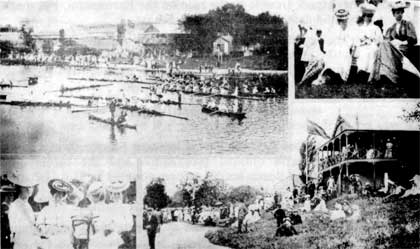
Opening Day in the early 1900's.
The 500 chairs ordered were clearly not sufficient to accommodate all the bottoms and the grating under the copper in which the water was boiled behind a screen on the grass area alongside the clubhouse, collapsed. Many people not invited hung around and some even "partook of refreshments", so in future it was resolved that each person should be identified on an invitation card.
Meanwhile, the races for the President's Cup were being rowed, and after winning 2 heats, a crew, traditionally formed from two senior and two junior oarsmen, won the final, and collected the trophies provided by a donation from the President, and worthwhile trophies they were, too.
Caleb Peacock, rest his soul, was followed by a fine procession of Presidents who knew what was expected of prominent men associated with Sporting Clubs, and their wives came to the party, too!
A Memorable Rowing Season
Starting with the Summer Regatta, on the Torrens, when Club crews won the Ladies' Challenge Shield, a Junior 4's race and two Maiden 4's, they went on to win Champion 8's and Champion 4's, both rowed from behind Torrens crews in the lead for most of the race.
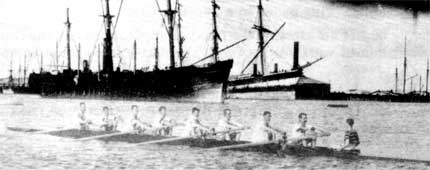
1905 Champion Eight
Bow: R A Anderson, 2: P H Upton, 3: R F Richardson, 4: R C Baker, 5: M A Fotheringham, 6: F W Porter, 7: J H Gosse, Str: A J Grayson, Cox: V Smith
At the Autumn Regatta for junior oarsmen, A.R.C. won three more races. That was not all. The Interstate 8 had four men and the coxswain from Adelaides, plus the manager and coach as well.
The names of these great rowing men were H.H. Dutton and F.W. Porter, at bow and 2, J.H. Gosse and A.J. Grayson at 7 and stroke, with K.W. Sharp at cox, his father, Joe Sharp as manager, and W.H.G. Blain as coach. They struck trouble in the race on the Parramatta, but that's another story, and came 5th out of 6.
And when the Secretary totted up the number of active members on the books for the annual report, there were 19 fewer than there were three seasons ago, Mildred, Blyth and Acraman not participating, and E.G. Jesse, a very promising oarsman, having died.
Memorable Club Functions, Too
It was not as if rowing was all they did; not by a long way.
After that tremendous Opening Day, Christmas Morning was a lively affair with Joe Sharp's musical programme and the carols and reminiscences and the 4 dozen bottles or beer donated by H.R. Dixson, ordered through W.P. Auld and Sons before he went off to Sydney, matched with that firm's donation of another 4 dozen Maitland Ale.
Then came the Swimming Races, held at Glenelg baths once again, with schoolboys invited along to compete. K.D. Gordon was the new star, winning the Club Championship and the Neat Dive, and there were new races for schoolboys and for contestants fully clothed, also won by Gordon.
Two Smoke Socials were held, one at the South Australian Hotel to present an inscribed shield to H.R. Dixson in recognition of all he and his wife had done for the Club, and the other at the Imperial Hotel when the rowing and swimming trophies won during the year were handed over by the President, and Joe Sharp's musical items were enjoyed.
The Annual Ball was held once more at the North Adelaide Institute, this time, without Vice Regal patronage, and there was more scope for frivolity and at the end there was £25-0-0 for the faltering bank balance.
Season 1905-06
It is not recorded why Mr. E.W. Van Senden could not stand the pace, but another President, E.W. Hawker, Esq., was elected and faced up to the job of being a paternal figurehead, but without a wife to carry out that function that had become so important at the social gatherings of the Club - organizing the afternoon tea.
At the Annual General Meeting, the Captain, W.H.G. Blain, occupying that office for the seventh year in succession, proposed that A.J. Grayson be made an Honorary Life Member, thus showing how magnanimous he was, because Grayson was often a thorn in his side, a man who had been in power in the Club for a much longer period, and who spoke his mind when he disagreed with the Captain's decisions, especially as regards choosing crews to represent the Club at S.A.R.A. regattas.
But Grayson did not aspire to high office in the hierarchy, so long as he was allowed to stroke crews with keen oarsmen to back him up, he knew he was unique, and was almost worshipped by the young rowers keen to win races.
This gesture, then, secured his loyalty, and everyone knew he had earned the honour thus bestowed.
Another gesture that secured good relations was the mailing of the Adelaide Rowing Club's Annual Report to kindred clubs interstate and to old friends abroad, like H.M. Orr and Guy Stanton in London and W. Bell, at Palmerston in the Northern Territory.
At Opening Day, the weather was wet, and only about 200 guests turned up, so as the Club was standing the cost of afternoon tea, the price was not too steep, but still came to £8-10-0 for catering. That was the difference when the President did not have a wife to come to the party.
Among the new members at the opening of the season were three young men, all to become well known in different ways.
One was J.M. Napier, later to become Chief Justice, and Lieutenant Governor Sir Mellis Napier, the second one was F.A. Wyatt, "Buck" to many generations of St. Peter's boys, and a great friend of H.H. Dutton's. The third was Frank Kenneth Milne, who, having been a coxswain since the turn of the century, had turned 17 and was eligible for membership. His father, the former Captain of the Club, was pursuing his career, and his elder brother, Lance, was already a member, but with only limited success. By now young Ken was too heavy for coxing and was stroking scratch crews.
A New Neighbour
Mercantile Club, the promising rival formed from the merger of the former Norwood and Commonwealth Clubs after the 1898 flood, had applied for land from the Commissioner of Railways, right next to Adelaide Rowing Club, and there was concern that it might turn out to be the vacant plot to the east, but the Commissioner assured the Committee that "the said grant would not prejudice the interests of Adelaide Rowing Club", and so it proved, as Mercantiles built their boathouse side on to the Torrens, and all that could be seen from the Adelaide boathouse was a blank gable and a screen of trees.
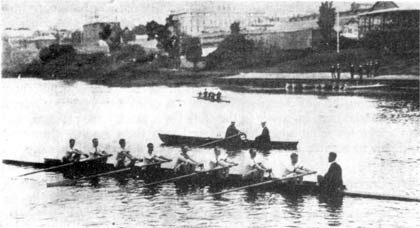
Champion 8's, 1906.
F. Angus, bow, C.B. Powell, 2, L.A. Lewis, 3, A.B. Harvey, 4, M.A. Fotheringham, 5, F. W. Porter, 6, D. Blyth, 7, H.E. Winterbottom, str., V. Smith, cox, W .H. G. Blain, coach in skiff.
"Mercs" disappeared from the scene in 1954 when the Club was in financial straits and could not afford to carry out structural maintenance to their timber boathouse, and the City Council slapped a demolition order on them and they were unable to comply in time.
In their day, Mercantile Rowing Club turned out some magnificent crews, and were consistently keen, tough competitors. Like all clubs, they had their vintage years and their lean years, but seeing them disappear like that was an object lesson to the survivors that sporting clubs have to be adaptable, and be able to call upon a wide circle of supporters when in need.
Consternation At Christmas Morning
Imagine the panic in the minds of the Committee, on opening up for the Christmas Morning function, and finding that the keg of beer presented by Johnsons of Oakbank, a dozen bottles of beer and half a gallon of whisky had been stolen from the club the previous night by intruders forcing the balcony doors.
W.G. Auld, once again, presented 4 dozen bottles of beer, compliments W.P. Auld and Sons, in time for lubricating the voices singing carols, and J.H. Aldridge donated a box of cigars, so that crisis was averted, and the 50 or 60 members were "of good cheer".
Stout padlocks were hastily fitted to the balcony doors.
The cards the Secretary was in the habit of sending out to remind members to turn up had this to say: "The usual Christmas carols will be sung at the Club's shed on Sunday morning the 24th inst. at 10.30 a.m. Come and bring a friend. Those who can, please bring a song".
Membership Drain
The recent trend among members, strangely, had shown a definite swing away from active membership, and towards non-active, especially among the younger set.
Being an "Iron man" in the Victorian image, was becoming less and less popular, as the Edwardian era progressed.
The Captain was having trouble finding enough men to make up an 8 to contest Champion 8's from 24 active oarsmen; 14 were seniors, 2 juniors, and 8 maidens, and most of the last season's 8 were unavailable.
But somehow they managed to assemble a crew of young hopefuls and with the luck and the equipment to stay afloat they won the race, the other 2 crews swamping and the time for the three mile course was 24 minutes; but Ports beat them in the Champion 4's.
The non-actives had their Socials and their Swimming Races and their Ball and their Theatre Night, but the rowing had taken a nosedive after winning champion 8's.
A ray of sunshine came in a letter from a former member, Max A. Boucaut, postmarked Transvaal, who was helping to start a Rowing Club in Germiston, and asked if A.R.C. would send him 2 or 3 copies of their rules. So he was sent his rules with the compliments of his old Club, and put on the books as an honorary member.
After a year as President, E.W. Hawker intimated that he would not be available next season, and once again a new one had to be found.
This time A.J. Roberts stepped into the breach, with a wife versed in organizing large quantities of afternoon tea.
Season 1906-07
Grayson and Gosse decided to give rowing away. Grayson would be about 37 years old by now, and Gosse was occupying a senior position in George Wills and Co. and marked for top management. Both men had rowed prodigiously for their Club and State and Gosse was rearing a family. Blain would have to manage without them. And poor old Blain was floundering. Never a man to trust his own judgement, he had crossed swords with Grayson two years ago choosing a crew for a regatta, and now he took a dislike to H.E. Winterbottom and upset the 8 and they came last in Champion 8's, and then the Club decided not to enter Champion 4's, yet three members of the state 8 were from Adelaide - Richardson, Winterbottom and Angus, but it could not have been a great crew, as it came in sixth (out of 6) at Port Adelaide.
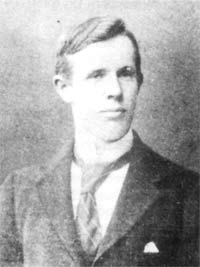
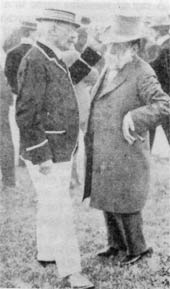
H E Winterbottom - Mr J J Sharp and Sir E T Smith
Winterbottom was the stroke of the Champion Eight of 1906 and later Hon, Sec of SARA. Sharp and Smith were two sports enthusiasts.
So the Club got through the season in a self indulgent way by introducing a water polo match into the Swimming Races at Glenelg Baths and by having one of those new fangled gadgets, the telephone, installed for £5-0-0 rent and 1000 calls free each year. Members whose rich friends had a telephone, could borrow the ‘phone key’ by paying threepence.
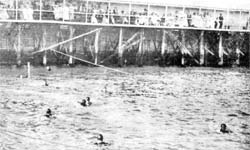
Water polo ARC v Eastern Extension Telegraph Co at Glenelg Baths, 1906
M.A. Fotheringham complained that there were no combs in the washroom, and the clothes brush was missing.
At two separate Smoke Socials, convened as Special Meetings, Honorary Life Membership was conferred on J.J. Sharp, and on the Captain, W.H.G. Blain, who was off to England.
Blain had done a lot for the Club, having been Captain for seven years running, the greater part of that with the Club's achievements at the very peak, but towards the close of that burst, he was seen to be too much of a perfectionist, even a fuss-pot, so they sent him off to England with a gold watch, suitably inscribed and so said all of them "For He's a Jolly Good Fellow".
Forrester chaired that meeting in April, and by August, he was dead. He had been a member almost from the very beginning, a painstaking and meticulous Secretary who held that post for four years, and then became Secretary of the S.A.R.A. for a number of years. He was the first of many A.R.C. men to hold that office.
The Club honoured his memory by naming the club races held annually in fours the "Forrester Fours". (formerly Senior-Junior 4's).
When the season had finished the Club had the record of having won the fewest number of races (namely 1), at S.A.R.A. regattas in its history, a record they were to surpass, but only during World Wars.
